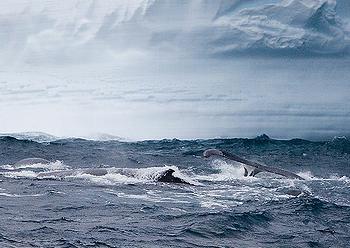
THE HAGUE, The Netherlands, March 31, 2014 (ENS) – The UN’s International Court of Justice today ruled that Japan’s whaling in the Antarctic is not for scientific purposes and violates the International Convention for the Regulation of Whaling. The court decided in favor of Australia, ordering Japan to end the “research” program immediately.
The court ordered Japan to revoke any existing permits and “refrain from granting any further permits” for its Antarctic research program, known as JARPA II.
The court’s decisions are legally binding and are not subject to appeal. Click here to read the court’s ruling.

Yoshihide Suga, Japan’s chief cabinet secretary, said in a statement that Tokyo is “deeply disappointed” by the decision, but he said Japan will comply with the decision as a country that respects the rule of law.
Evidence was presented during a three-week hearing last June in the case brought by Australia in May 2010, and later supported by New Zealand.
The court unanimously rejected Japan’s claim that it has no jurisdiction over the whaling issue because no maritime boundary was at issue in the case.
By 12 votes to four, the court found that the special permits granted by Japan “to kill, take and treat” fin, humpback and Antarctic minke whales in connection with JARPA II violate the provisions of the International Convention for the Regulation of Whaling, a treaty to which both Japan and Australia are parties.
The court concluded that Japan violated three provisions of the treaty – the moratorium on commercial whaling imposed by the International Whaling Commission in 1986; the factory ship moratorium; and the prohibition of commercial whaling in the Southern Ocean Sanctuary declared by the Commission in 1994.
The court sided with Japan only on one issue. The judges found, by 13 votes to three, that Japan had complied with its obligations to notify the IWC’s Scientific Committee of its whaling program.
Japan has been authorizing up to 935 Antarctic minke whales to be killed each year, as well as 50 fin and 50 humpback whales, arguing this is necessary for scientific research.

Since the global moratorium on commercial whaling was introduced, Japan has killed more than 14,000 whales in the name of science, most of them in the Southern Ocean. The 2013-2014 kill figure has not yet been released.
The judgment was applauded and celebrated by whale conservationists, including Sea Shepherd Conservation Society USA and Sea Shepherd Australia, both of which have directly intervened against Japanese whalers in the Southern Ocean.
“Despite the moratorium on commercial whaling, Japan has continued to claim the lives of thousands of the gentle giants of the sea in a place that should be their safe haven,” said Sea Shepherd Founder Captain Paul Watson. “Sea Shepherd and I, along with millions of concerned people around the world, certainly hope that Japan will honor this ruling by the international court and leave the whales in peace.”
Greenpeace International whales campaign coordinator John Frizell said, “We welcome this outcome which vindicates our view that whaling in the Southern Ocean is not necessary for science and should be ended. We urge Japan to abide by this decision, scrap the factory ship Nisshin Maru and not attempt to continue whaling by amending the program and claiming it is now scientific.”
Humane Society International’s Alexia Wellbelove said, “The judges have now spoken and clearly ruled in support of Australia’s position, exposing Japan’s whaling in Antarctica to be what we have been saying for some time – that it is commercial whaling in disguise. We now expect Japan to abide by the decision of the international court and end its whaling in the Southern Ocean for good.”

“We welcome the court’s findings,” said Patrick Ramage, Global Whale Programme Director with the International Fund for Animal Welfare, who was in court for the judgment. “IFAW had long pushed for whales to have their day in court, and we are very pleased that justice has been served.”
“Non-harmful research on live whales, by contrast, is producing valuable data and IFAW encourages Japan to join Australia, Brazil, the U.S. and others in the Southern Ocean Research Partnership, which coordinates scientific research on Southern Ocean whales and their environment using effective benign techniques,” said Ramage.
Sarah Gregerson, a lawyer working on whale and dolphin conservation for the British nonprofit Client Earth, said the decision “is a ringing endorsement of the importance of international law to environmental protection.”
“The fact that both Japan and Australia have entrusted strongly held opposing views on scientific whaling to the jurisdiction of an international court is great news for the application of international environmental law,” Gregerson said. ” The decision has also added hugely to the credibility of what is sometimes regarded as an outmoded international convention.”
Copyright Environment News Service (ENS) 2014. All rights reserved.
© 2014, Environment News Service. All rights reserved. Content may be quoted only with proper attribution and a direct link to the original article. Full reproduction is prohibited.
